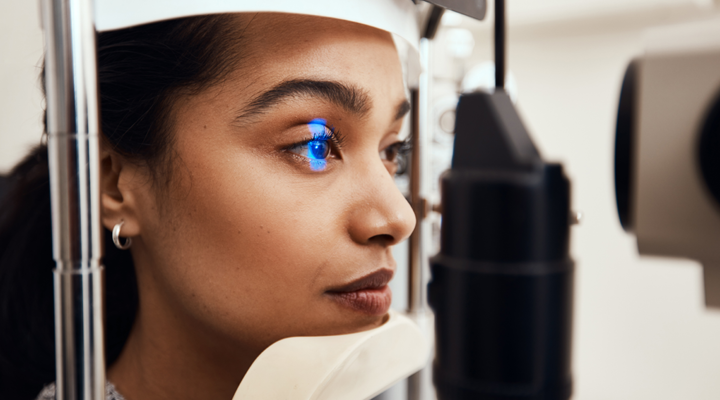Today, nearly three million Americans have glaucoma. However, because symptoms are nearly impossible to catch early, 50 percent of people with glaucoma are unaware they have the disease.
What is glaucoma?
Glaucoma is a group of eye diseases that damage the optic nerve, which is essential for clear vision. If left untreated, glaucoma can gradually lead to permanent vision loss and even blindness.
Types of glaucoma
Angle-closure glaucoma
Also called closed-angle or narrow-angle glaucoma, it occurs when the drainage system in the eye becomes blocked, causing an increase in eye pressure. This can happen rapidly or over time, and symptoms include severe eye pain, nausea, blurry vision, and headaches. Rapid onset is a medical emergency and requires immediate treatment to prevent vision loss.
Open-angle glaucoma
This is the most common type of glaucoma. It occurs when the eye’s drainage canals become clogged over time, causing increased eye pressure. Open-angle glaucoma develops slowly and painlessly, often without noticeable symptoms until vision loss has occurred. Therefore, early detection through comprehensive eye exams are key in preventing severe damage to the eye.
Normal-tension glaucoma
In this form of glaucoma, optic nerve damage occurs despite having normal eye pressure. The exact cause is not well understood, but factors like poor blood flow to the optic nerve may contribute.
Congenital glaucoma
Congenital glaucoma is a rare form that occurs in infants and young children due to improper development of the eye’s drainage system. Symptoms may include cloudy eyes, excessive tearing, and sensitivity to light. Early intervention is crucial to prevent vision loss.
Symptoms of glaucoma
Many people with glaucoma do not experience symptoms in the early stages. However, as the disease progresses, symptoms may include:
- Gradual loss of peripheral (side) vision
- Blurred or hazy vision
- Red or bloodshot eyes
- Eye pain or pressure
- Headaches
- Low vision
- Double vision
How to diagnose glaucoma
During the dilation portion of your comprehensive eye exam, your doctor will check for signs of glaucoma with a widely used method that allows for a thorough examination of the optic nerve and retina. It helps to detect early indicators of glaucoma, such as changes in the shape or color of the optic nerve or cupping of the optic disc. Early detection is key to preserving vision and preventing further damage.
Other tests can be used to diagnose glaucoma, including:
- Optic nerve imaging: Damaged areas are identified through photographs of the optic nerve.
- Visual acuity test: Using an eye chart, your eye doctor will measure distance and visual sensitivity to help identify specific injuries and diseases.
- Gonioscopy: An examination of the drainage angle using a lens placed over the eye to determine if the drain is open or closed.
- Visual field: A measurement of a person’s peripheral vision. Poor or completely lost peripheral vision may be a sign of glaucoma.
- Tonometry: A small, handheld device is used to measure the fluid pressure inside the eye.
Is glaucoma preventable?
No. Glaucoma is not preventable. However, early detection is paramount because your eye doctor can help manage your glaucoma and reduce the chance of vision loss. The seriousness of waiting too long to treat glaucoma is why it is essential to schedule regular eye exams and catch it early on.
How is glaucoma treated?
Treatment options vary depending on the type of glaucoma and the stage of the condition.
- Laser treatment: Lasers can be used to help drain excess fluid out of your eye.
- Medication: Prescription eye drops can help reduce the pressure inside your eye and slow down damage to your optic nerve.
- Surgery: Your doctor may also recommend glaucoma surgery. There are a couple of different types of surgery, all done to help drain fluid out of the eye.
The bottom line on glaucoma
Glaucoma is a leading cause of blindness, but early detection and treatment can help preserve vision. If you’re at risk or haven’t had an eye exam in a while, schedule a comprehensive eye check-up today.
Want to read more about eye health? Check out “The Link Between Eye Health and Lifestyle Choices.”
Delta Dental of Colorado now offers vision insurance through DeltaVision®. Go to DeltaVision to learn more.

